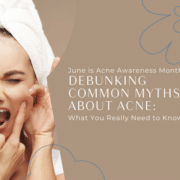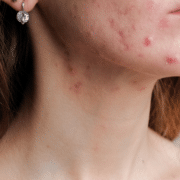Debunking Common Myths About Acne: What You Really Need to Know
Acne is one of the most common skin conditions, affecting people of all ages. Despite its prevalence, numerous myths and misconceptions about acne persist, often leading to confusion and ineffective treatments. As a dermatology practice dedicated to providing accurate and helpful information, we aim to debunk some of the most common acne myths. Understanding the facts can help you manage your skin better and achieve clearer, healthier skin.
Myth 1: Acne Is Caused by Poor Hygiene
Debunked: Acne is not caused by poor hygiene. Acne develops when hair follicles become clogged with oil and dead skin cells, often exacerbated by hormonal changes, bacteria, and inflammation. Over-washing or using harsh cleansers can actually irritate the skin and worsen acne. Instead, use a gentle cleanser twice daily to maintain skin health without stripping away essential moisture.
Myth 2: Eating Greasy Foods Causes Acne
Debunked: There is no direct link between eating greasy foods and developing acne. While some studies suggest that certain foods, like those with a high glycemic index (e.g., sugary snacks and refined carbs), can exacerbate acne, the overall impact of diet on acne varies from person to person. Maintaining a balanced diet and observing how your skin responds to different foods can be more beneficial.
Myth 3: Acne Is Only a Teenage Problem
Debunked: Acne is often associated with adolescence due to hormonal changes, but it can affect people of all ages. Many adults experience acne, often due to factors like stress, hormonal imbalances, and certain medications. Adult acne is a common condition, and effective treatments are available regardless of age.
Myth 4: Tanning Clears Up Acne
Debunked: While tanning may temporarily hide the redness of acne, it does not treat the condition and can actually make it worse. UV exposure can lead to increased skin cell turnover and clogged pores, and it also increases the risk of skin cancer and premature aging. Using non-comedogenic sunscreens and avoiding excessive sun exposure are better practices for skin health.
Myth 5: Popping Pimples Helps Them Heal Faster
Debunked: Popping pimples can lead to further inflammation, infection, and scarring. It may also push bacteria deeper into the skin, exacerbating the problem. Instead, use topical treatments that contain ingredients like benzoyl peroxide, salicylic acid, or retinoids to treat acne effectively and avoid manipulation that can damage the skin.
Myth 6: Only Topical Treatments Can Cure Acne
Debunked: While topical treatments are effective for many people, acne often requires a comprehensive approach. Oral medications, such as antibiotics, hormonal treatments like birth control pills, and isotretinoin, can be necessary for severe cases. Consulting with a dermatologist can help determine the best combination of treatments for your specific needs.
Myth 7: Makeup Causes Acne
Debunked: Not all makeup causes acne. The key is to choose non-comedogenic products that are designed not to clog pores. Removing makeup thoroughly before bed and following a proper skin care routine can help prevent breakouts. Many cosmetic lines now offer products formulated specifically for acne-prone skin.
Myth 8: Acne Will Go Away on Its Own
Debunked: While some mild cases of acne may resolve without treatment, many people need a targeted approach to manage and clear their skin effectively. Without proper treatment, acne can persist and may lead to scarring and emotional distress. Seeking professional advice from a dermatologist ensures that you receive the appropriate care for your condition.
Seeking Professional Help
Understanding the facts about acne is crucial for effective management and treatment. If you’re struggling with acne, don’t hesitate to consult with our dermatology practice. We can provide a personalized treatment plan tailored to your skin type and condition, helping you achieve clearer, healthier skin.
By debunking these common myths, we hope to empower you with accurate information and encourage proactive, informed decisions about your skin health. Remember, clear skin is possible with the right knowledge and care.










